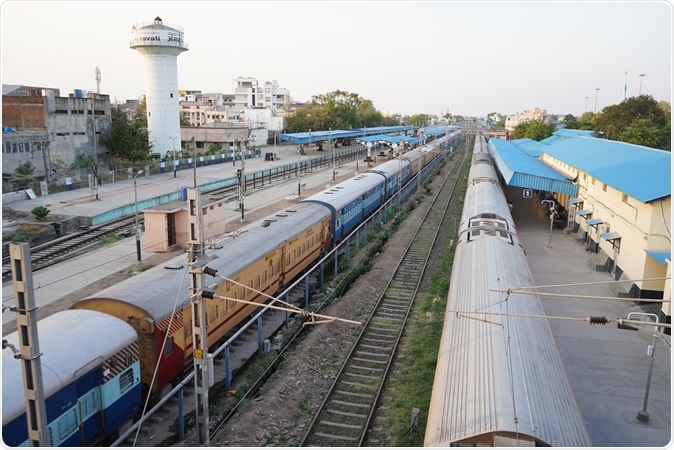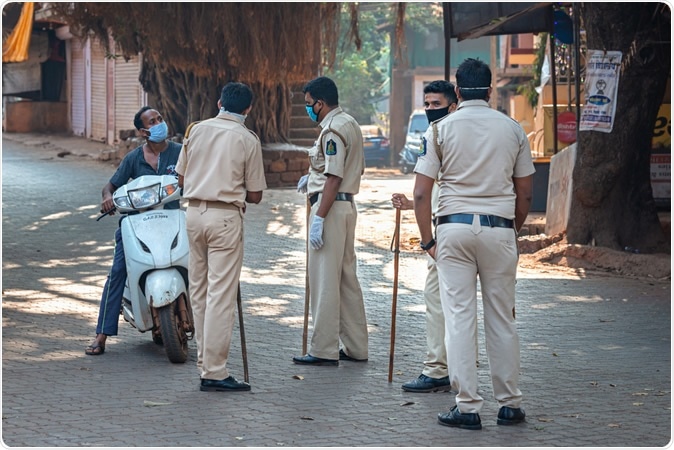India, a nation of 1.3 billion, most of them poor, is braced to meet the coronavirus attack with a mixture of fatalism and active measures. With the 21-day lockdown announced by the Central Government from March 24, 2020, firmly in place, most citizens hesitate to step out of their houses even for perfectly legitimate needs. Hundreds of thousands of daily wage and internal migrant laborers stare starvation and homelessness in the face. And healthcare workers suddenly find themselves homeless as well solely because they are trying to help the sick.
To be sure, the government has announced an economic package worth $22.6 billion targeting daily wage earners. One proposal includes the most extensive food ration security scheme in the world. Under this scheme, the 800 million people who are registered under the nation's Public Distribution System (PDS) will get 7 kilograms of cereal grains (wheat or rice) and lentils each month for the next three months. This will cover two-thirds of the country. The Center has also announced the provision of free cooking-gas cylinders to 83 million poor families, and direct cash transfers to 200 million women and the elderly.
Many state governments have rolled out their own programs as well, to ensure food security for the poor, who have no reserve funds to fall back on. The Delhi government has distributed INR 5000 to each of 35,000 construction workers and has announced similar cash assistance to the auto, taxi and e-rickshaw drivers in the capital city as well.
While the government has promised abundant food, and large buffer stocks actually do exist, the lockdown regulations, transportation bottlenecks, and socioeconomic disparities threaten to destabilize the country's hungry poor by keeping food, even free food, out of their reach. In response, Kerala led the way in announcing that it would arrange home delivery of food essentials to poor families, followed by Uttar Pradesh with a large and mostly poor population.
However, trade unions say this is hardly enough. They stress that the informal labor sector, without contracts or benefits, is hardest hit by the lockdown. This includes, besides daily wage laborers, casual laborers, migrant laborers, farm labor, hawkers and vendors, rickshaw pullers, taxi and auto drivers, construction workers, truck drivers, headload carriers, and domestic workers, to mention only a few.
"It's an evolving situation with daily new challenges coming up, like having migratory populations moving from one place to another. Like non-affected states adjoining affected states," comments S.K. Singh, director of the National Centre for Disease Control, which oversees control measures for outbreaks.
Hardest hit
The hardest hit are the poor. About 120 million internal migrant laborers who left their homes in one state to work in another, often hundreds or thousands of kilometers away, to earn a living, found themselves stranded overnight, without hope of surviving three weeks without work. These millions, who survive on their daily wages, found themselves caught by surprise when the lockdown descended on them at night, with barely a few hours' notice.
Migrant laborers are the backbone of India's domestic construction and unskilled labor industry. Often leaving family behind, they live in crowded basic accommodations. The payment is typically four or five times the pittance they would receive in their home states.
When the lockdown came, this subset of Indian society was caught entirely off guard. Without work or income for days, without accommodation, and with no buffer to wait it out, thousands of them huddled together, waiting for a way to get back home. When it became clear that there was none, many decided to walk home.
As the vast crowds accumulated along the closed state borders, Uttar Pradesh, Delhi, and Haryana belatedly woke to the reality to provide 1,500 buses. Packed to the hilt, they ferried many laborers back to their home districts where they will be in quarantine for 14 days, after a mandatory health check.
The crush of migrant families, thousands upon thousands of them, pressing to board one of the few buses, or trudging wearily across several states to reach their native villages, has horrified India, both because of their sheer misery and because of the mockery it has made of the lockdown.
This is a heartbreaking story. Hellish journeys, with far too few buses, and no trains, have brought many of them home on painful feet, in a state of near-starvation. But having reached, they are still unsure how they will now survive without work, without food, without money. The oft-repeated refrain is, "I don't know how we will survive."

AMRAVATI, MH, INDIA 22 MARCH 2020: Parked trains at Amravati railway station during curfew imposed as a preventive measure against the COVID-19, Appeal of Prime Minister Indi. Image Credit: CRS PHOTO / Shutterstock
Exodus
And now, since Sunday evening, migrants walking on the highways or arriving at the state borders by foot are being arrested, to enforce the lockdown. When disease, hunger, and stress combine, can death be far behind?
Some villages are barring the return of their own people before a health check is done, to keep out infection. And governments have set up hundreds of quarantine camps for the migrants, where they will be housed and fed while they wait for the lockdown to ease. In one place, at least, migrants on the move were hosed down with bleach solution, which the health workers manning the hoses were supposed to use on buses. The government has promised disciplinary action against those responsible.
In Kerala, where the state government calls migrant laborers its "guest workers," migrants are promised that they will be provided for while they are out of work. But even here, the workers are restless, demanding that they are sent home – a proposition that the government cannot easily grant in the current situation.
Police crackdown
Meanwhile, the first few days saw the police in some places over-reacting to people on the street despite the lockdown. With no set standards in place, police forced those violating the lockdown to endure canings with the bamboo police stick, to do push-ups on the road where they were caught breaking the lockdown, sitting in the open road within circles placed at the appropriate 'social distances', and similar humiliating acts. But will this really elicit the one thing the government needs – the cooperation of India's enormous masses?

03/28/2020 India, GOA, Arambol, Police (CRPF) personnel stops and controled commuters during Indian lockdown and curfew as preventive measure against COVID-19 coronavirus. Image Credit: leshiy985 / Shutterstock
Foreigners' plight
About 400 Australians stuck in India report they need help getting back. They have been told to remain in the hotel they are staying in, for instance, during the lockdown. Local shops selling essential supplies and pharmacies were supposed to stay open, but many people are thinking hard and long before they venture out of their homes.
Doctors, healthcare professionals victimized
Despite the apparently wholehearted appreciation shown by millions of Indians last Sunday evening when they flooded outside their homes, to honor their medical service providers by clapping, banging tins and pots and otherwise making noise, in real life, such respect is still woefully lacking in many cases.
Healthcare professionals are treating patients who could potentially have COVID-19, and doing so with little specialized training or equipment. However, unlike other countries, the reward many of them have received in India is ostracism and notice to leave their rental accommodation with immediate effect. Others are unable to enter their own apartments because of the widespread perception that those working in hospitals are bringing back the virus with them.
Fear. Pervasive, selfish, and unreasoning fear, born of ignorance, poverty of resources, and a lack of faith in administrative intentions or ability. And all this has led to the eviction of many doctors from their homes or being turned away and asked to go elsewhere.
Thousands of healthcare workers, such as the so-called 'hospital attenders' who carry out most of the hospital's menial work from cleaning, ferrying patients between departments, and other low-profile but essential jobs, are also staying at the hospitals they work at to avoid getting into trouble or getting an eviction notice for their families. Some report how their landladies told them, "There must be coronavirus patients around you in your hospital. We know that the virus floats in the air and infects everyone around. This is why thousands of people around the world have been infected. You have to leave the apartment."
And this to workers who are not in contact with potentially infected patients at all. Doctors at the prestigious All India Institute of Medical Sciences asked the government for help, describing how "Many doctors are stranded on the roads with all their luggage, nowhere to go, across the country." In the words of another doctor working in a "coronavirus hospital" (dealing with infectious disease): "It seems that the people in the country have found yet another reason to ostracize and abuse its medical personnel who are at the frontline of this battle against Covid-19."
Inside the profession, too, things are far from rosy, with health workers facing the virus with little more than basic masks, if that. Personal protective equipment is not even a dream in most government hospitals.
Supply chains squeezed
And hunger looms large in the minds of India's poor, who are hit where it hurts the most by the lockdown. About 300 million people live below the poverty line, and 450 million are daily wage workers.
India had no option but to shut down – but the needs of the most helpless should have been kept firmly in mind.
Sources:
- Oaten, J., and Patidar, S., (2020). India's Coronavirus Measures Prompt Beatings and Forced Push-Ups. Travellers Say They're Scared to Leave Hotel Rooms. https://www.abc.net.au/news/2020-03-30/indias-coronavirus-lockdown-turns-ugly/12102032
- Ellis-Petersen, H. and Rahman, S. A. (2020). Indian Doctors Being Evicted From Homes Over Coronavirus Fears. https://www.theguardian.com/world/2020/mar/30/indian-doctors-being-evicted-from-homes-over-coronavirus-fears
- Sarkar, S. (2020). In India, Doctors Evicted Over Infection Fears Amid Expected Flood Of Coronavirus Cases. https://www.scmp.com/week-asia/health-environment/article/3077550/india-doctors-evicted-over-infection-fears-amid
- Ellis-Petersen, H. and Chaurasia, M. (2020). India Racked By Greatest Exodus Since Partition Due To Coronavirus. https://www.theguardian.com/world/2020/mar/30/india-wracked-by-greatest-exodus-since-partition-due-to-coronavirus
- Aljazeera.com. (2020). Migrants in India Sprayed With Disinfectant To Fight Coronavirus. https://www.aljazeera.com/news/2020/03/migrants-india-sprayed-disinfectant-fight-coronavirus-200330135052425.html
- Theweek.in. (2020). Explainer: Migrant Crisis Amid The Coronavirus Pandemic. https://www.theweek.in/news/india/2020/03/29/explainer-the-migrant-crisis-amid-the-coronavirus-pandemic.html